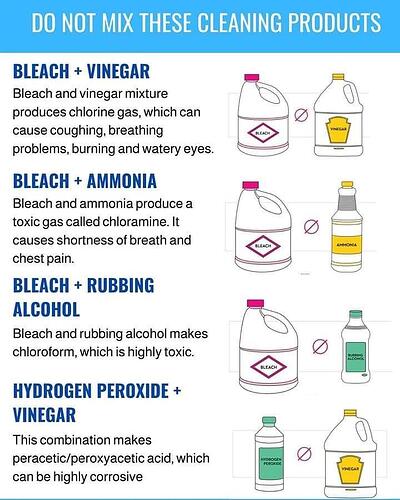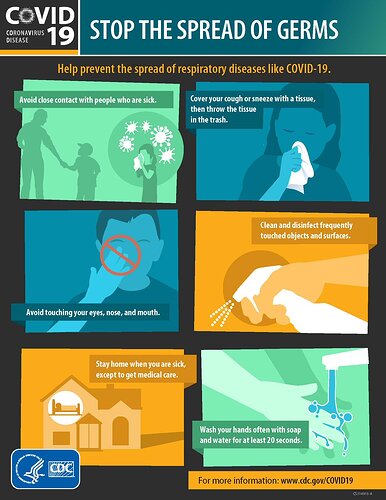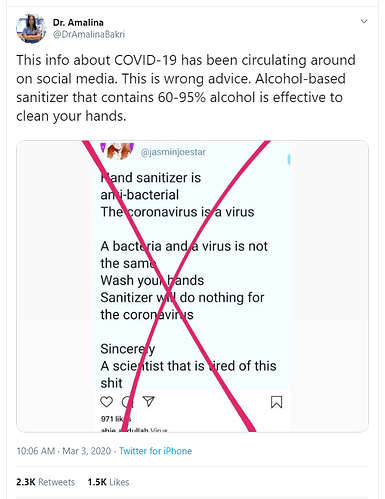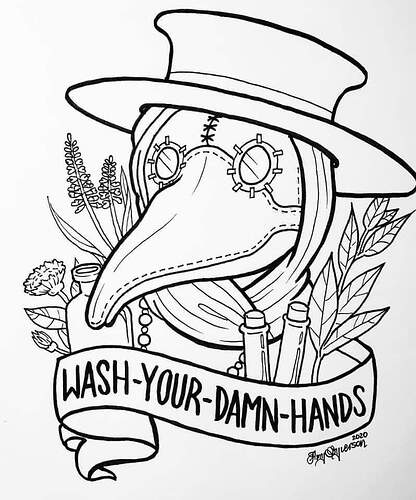We can’t emphasize this strongly enough: Do Not Take Any Medication without a Doctors recommendation. Trump is not a Doctor. The Chloroquine treatment is being tested as we speak. If you attempt to play Doctor by yourself or with others, there is a high chance of dangerous side effects from it or other medications (like damaging your heart). Its antimalaria but also used in Lupus treatment. If you try to go get it as a preventative, you could harm yourself and take away supply from people who need. Get some sleep, some sunlight for vitamin D and leave medications to the professionals.
What you need to know right now
CoVid-19, also referred to as coronavirus or simply covid, is a highly contagious novel disease that attacks the respiratory system. CoVid-19 is spread by aerosol droplets from coughs, sneezes, and speaking. People can carry the virus without having symptoms, and may be contagious for two or more weeks.
Virtually no one is immune or has resistance to this new disease, and it has an extremely high fatality rate among older people (>50 years old), and people with a wide range of underlying conditions.
Even if you are young and have no known underlying conditions, you are not completely safe. Young and healthy individuals have been hospitalized by and/or died from this disease.
The best way to protect yourself right now is by hygiene and social distancing. This means avoiding public gatherings or crowds, wash you hands thoroughly after being in public, and never touching your face with unclean hands.
The main symptoms are fever, dry cough, shortness of breath, and a loss of sense of smell or taste. Not everyone will display all symptoms.
IF YOU BELIEVE YOU MAY BE SICK, CALL YOUR DOCTOR. Your doctor will give you the best guidance for your specific situation. Please only go to the Emergency Department if you are having trouble breathing or have a fever that cannot be controlled by medication.
See below for further important details about this disease.
Please use cleaning products as directed.
If you have Lysol, you need to let it sit on surfaces for 10 minutes before you wipe it down for maximum effect. Below this section there is an article of how long CoVid_19 sticks around surfaces. Also avoid doing any of these:
NEW VERIFIED INFO: How long does it stay in surfaces:
Summary
The virus that causes coronavirus disease 2019 (COVID-19) is stable for several hours to days in aerosols and on surfaces, according to a new study from National Institutes of Health, CDC, UCLA and Princeton University scientists in The New England Journal of Medicine . The scientists found that severe acute respiratory syndrome coronavirus 2 (SARS-CoV-2) was detectable in aerosols for up to three hours, up to four hours on copper, up to 24 hours on cardboard and up to two to three days on plastic and stainless steel. The results provide key information about the stability of SARS-CoV-2, which causes COVID-19 disease, and suggests that people may acquire the virus through the air and after touching contaminated objects. The study information was widely shared during the past two weeks after the researchers placed the contents on a preprint server to quickly share their data with colleagues.
New coronavirus stable for hours on surfaces | National Institutes of Health (NIH)
Handy article on the numbers and what they mean
What is it?
Summary
CoVid_19 is a virus that targets the respiratory system. The outbreak began in city of Wuhan (in the province of Hubei) in China.
Wasn’t this the Corona Virus? Why CoVid?
Summary
The W.H.O. gave its name some time in February. At the beginning it was called the Novel Coronavirus. After it became endemic in China, it was given a name that would allow all scientists to discuss properly.
The name of the virus is SARS-CoV-2. The disease it gives you is CoVid 19. Similar to the HIV/AIDS situation.
What does it do?
New Info:
Summary
It does various things. Causes a dry cough and fever early on. It can develop into viral Pneumonia or ARDS depending on the person. Around 80% to 90% of cases have flu like symptoms. 20% to 10% develop complications which require hospitalizations.
More information on the virus itself:
How Coronavirus Kills: Acute Respiratory Distress Syndrome (ARDS) & COVID 19 Treatment - YouTube
Who is at risk?
Summary
At the moment its people over the age of 60, those with compromised immune systems, and a few other preexisting conditions (asthma, obesity etc).
Children seem largely unaffected by the disease.
How does it spread?
Summary
From contact, droplets and aerosol from an infected person. This basically means the coughing and sneezing from an infected person. The virus has also been found in the feces.
It can stay on surfaces up to 9 days (this entirely on conditions). All these methods require that it go into either your mouth, eyes or nasal cavities.
People who are asympthomatic can also spread it. Just because a person isn’t showing any symptoms, doesn’t mean that they don’t have it.
It can spend as much as 30 minutes in the air and go as far as 4.5 meters.
I know this seems a bit hard to accept but there will be sources for all of these soon.
How can I protect myself?
Summary
The most important thing is to avoid touching your face while in public. You can still catch it if people cough or sneeze in your face (which has happened to me an incredible amount of times since this all started), but touching your face will increase the events that could infect you.
Make sure you watch your hand for 20 seconds like so:
How to Wash Your Hands Properly to Stay Safe and Healthy - YouTube
Using hand sanitizer (60% alcohol or better). You’ll do the same motions as washing your hands. Let the hand sanitizer air dry.
What about Face masks?
Summary
Because you can still be infected through droplets hitting your eyes, the masks covering your nose and mouth won’t entirely protect you. If you need to go out wearing a mask, you need goggles. Then you still need to make sure you have a proper seal around your face with the masks. Lastly you can’t take them off until you get back home and wash your hands to take off all the stuff to dry it/decontaminate it and then rewash your hands.
The masks that can protect you are n95 or better; same with all the stuff that CDC and other labs use. If you get the lab grade stuff, you still need a negative pressure room in your house with a full decontamination protocol with a bleach shower and all that. So there you go.
How do I tell it apart from other similar conditions?
Summary
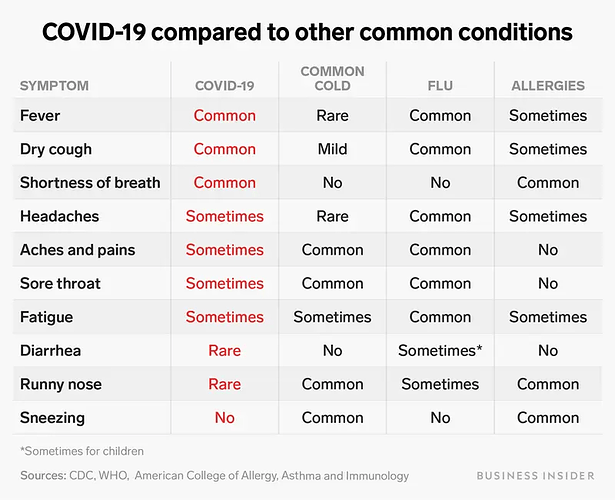
Where are the known cases of the virus?
Stop the spread of germs:
